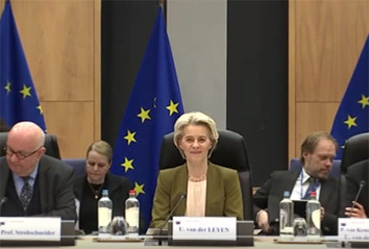The Presidencies of Copa and Cogeca received an invitation from the President of the European Commission, Ursula Von Der Leyen, to participate in the opening session of the strategic dialogue on the future of agriculture.
Copa and Cogeca subscribe to the conviction of President Von Der Leyen, who stated: “We need to find concrete and functional solutions for agriculture.” The challenges are numerous and persistent: climate change, safeguarding the competitiveness of farms, ensuring a decent income, reducing administrative burden, or guaranteeing generational renewal. All these challenges will become even more serious in the coming years.
These organizations have also made it clear the expectations of all farmers who are taking to the streets to demonstrate across the EU. Given the current context, this dialogue is both crucial and timely, hence it has aroused great expectations.
During COVID-19, agriculture was considered an essential sector; since the war in Ukraine, it has become strategic and now, with climate change wreaking havoc, it has also become vulnerable. “We must give it the relevance it deserves in the EU’s political agenda,” say Copa-Cogeca.
The meeting marked the beginning of a new process, the conclusions of which will not be known until this summer. Until then, agricultural organizations will participate in various thematic meetings, in line with the principles set out by the European Commission.
European farmers and agricultural cooperatives demand “well-founded debates,” based on “reliable information, scientific evidence, and specialized knowledge from all stakeholders.” “This approach is essential to achieve a favorable outcome and restore trust between institutions and farmers”.
Copa Cogeca concludes its demands by stating that “European agriculture has the most sustainable model in the world. Farmers and agricultural cooperatives are essential to the food and energy supply chains, crucial in the current geopolitical context and deserve to be recognised as strategic”, and they therefore expect “a reaction from the European executive so that they can continue their activities in acceptable conditions, with a decent income and fewer administrative burdens”, say Copa president Christiane Lambert and Cogeca president Lennart Nilsson.
New genomic techniques: the European Parliament supports them
In parallel with farmers’ protests, the European Parliament has approved the report by MEP Jessica Polfjärd (EPP, Sweden) on new genomic techniques (NGTs) with 307 votes in favor, 263 against, and 41 abstentions. The EU agricultural community welcomes this vote as a “new step in the right direction.” NGTs are among the alternatives available to farmers to reconcile production demands and adaptation to climate change.
The report adopted in the European Parliament endorses the structure proposed by the Commission, which envisages a two-category approach for plants with NGTs: those obtained with category one NGTs are considered equivalent to conventional ones. Therefore, they are subject to the regulations for conventional seed breeding. In contrast, plants with category two NGTs would be subject to stricter requirements. Copa and Cogeca assert that this balanced approach is indeed the right one.
As Health Commissioner Stella Kyriakides pointed out, it is now up to the Council to approve its general orientation. Consequently, Copa and Cogeca call on Council negotiators to promptly reach a consensus position on NGTs.







